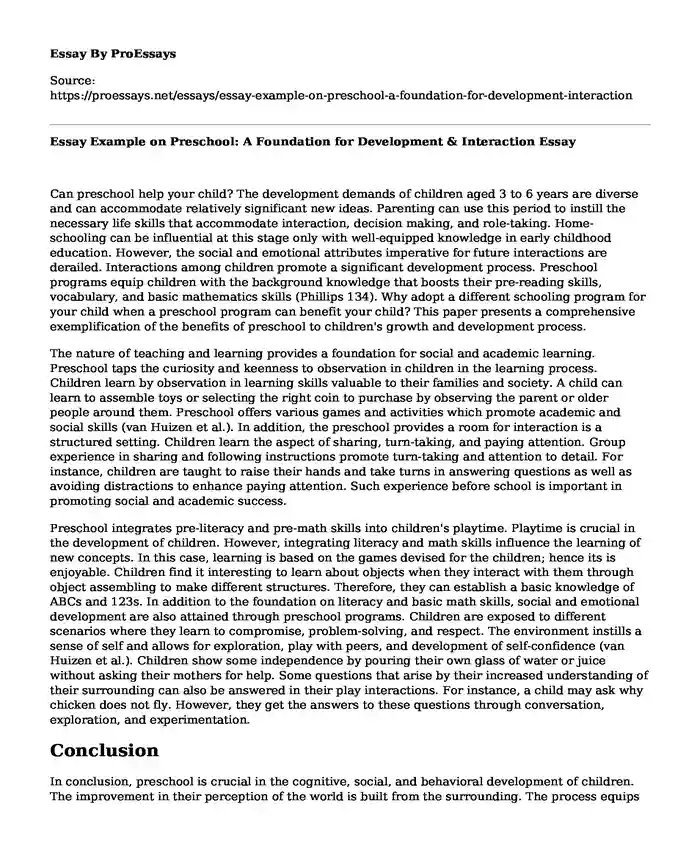Can preschool help your child? The development demands of children aged 3 to 6 years are diverse and can accommodate relatively significant new ideas. Parenting can use this period to instill the necessary life skills that accommodate interaction, decision making, and role-taking. Home-schooling can be influential at this stage only with well-equipped knowledge in early childhood education. However, the social and emotional attributes imperative for future interactions are derailed. Interactions among children promote a significant development process. Preschool programs equip children with the background knowledge that boosts their pre-reading skills, vocabulary, and basic mathematics skills (Phillips 134). Why adopt a different schooling program for your child when a preschool program can benefit your child? This paper presents a comprehensive exemplification of the benefits of preschool to children's growth and development process.
The nature of teaching and learning provides a foundation for social and academic learning. Preschool taps the curiosity and keenness to observation in children in the learning process. Children learn by observation in learning skills valuable to their families and society. A child can learn to assemble toys or selecting the right coin to purchase by observing the parent or older people around them. Preschool offers various games and activities which promote academic and social skills (van Huizen et al.). In addition, the preschool provides a room for interaction is a structured setting. Children learn the aspect of sharing, turn-taking, and paying attention. Group experience in sharing and following instructions promote turn-taking and attention to detail. For instance, children are taught to raise their hands and take turns in answering questions as well as avoiding distractions to enhance paying attention. Such experience before school is important in promoting social and academic success.
Preschool integrates pre-literacy and pre-math skills into children's playtime. Playtime is crucial in the development of children. However, integrating literacy and math skills influence the learning of new concepts. In this case, learning is based on the games devised for the children; hence its is enjoyable. Children find it interesting to learn about objects when they interact with them through object assembling to make different structures. Therefore, they can establish a basic knowledge of ABCs and 123s. In addition to the foundation on literacy and basic math skills, social and emotional development are also attained through preschool programs. Children are exposed to different scenarios where they learn to compromise, problem-solving, and respect. The environment instills a sense of self and allows for exploration, play with peers, and development of self-confidence (van Huizen et al.). Children show some independence by pouring their own glass of water or juice without asking their mothers for help. Some questions that arise by their increased understanding of their surrounding can also be answered in their play interactions. For instance, a child may ask why chicken does not fly. However, they get the answers to these questions through conversation, exploration, and experimentation.
Conclusion
In conclusion, preschool is crucial in the cognitive, social, and behavioral development of children. The improvement in their perception of the world is built from the surrounding. The process equips children with social and emotional development and enhances independence. Teachers use different approaches, such as counting food items in teaching numbers, which indicates the use of locally available items in enhancing cognitive development. Preschool focuses on children by scheduling fun sessions in equipping children with social and cognitive skills. Therefore, preschool provides a foundation for school and build the social and emotional skills of learners.
Works Cited
Phillips, Deborah A. "Commentary: Beyond more of the same–sustaining the benefits of preschool education–reflections on Bierman et al.(2016)." Journal of Child Psychology and Psychiatry 58.2 (2017): 138-139. https://doi.org/10.1111/jcpp.12674
van Huizen, Thomas, Lisa Dumhs, and Janneke Plantenga. "The costs and benefits of investing in universal preschool: Evidence from a Spanish reform." Child development 90.3 (2019): e386-e406. https://doi.org/10.1111/cdev.12993
Cite this page
Essay Example on Preschool: A Foundation for Development & Interaction. (2023, Sep 10). Retrieved from https://proessays.net/essays/essay-example-on-preschool-a-foundation-for-development-interaction
If you are the original author of this essay and no longer wish to have it published on the ProEssays website, please click below to request its removal:
- Scholarship Letter Example
- Essay Sample on Gun Violence in School
- Effects of Reading to Infants and Toddlers on Their Early Language Development
- Administrative and Teacher Preparation Programs Essay Example
- Essay Sample on Campus Crimes
- Paper Example on Rams Project: Improving Students' Academic Performance and Teacher Preparedness
- Essay Example on Miller's Curriculum Theory & Practice: Implications for Teacher, Learner & Quality







